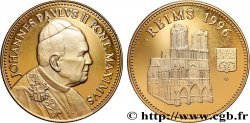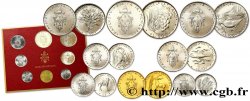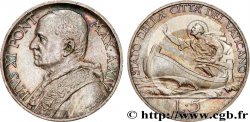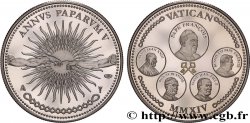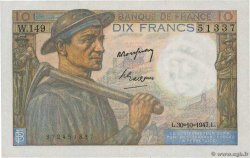E-auction 143-82796 - fwo_329531 - VATICANO E STATO PONTIFICIO 2 Lire Pie IX an XXII 1867 Rome
Devi Sign-in ed essere un offerente approvato fare un'offerta, Login per fare offerte. Conti sono soggetti ad approvazione e di approvazione sono raggiunti entro 48 ore. Non aspettare fino al giorno di una vendita si chiude per registrarti.Confermando la tua offerta su questo oggetto ti impegni ad un contratto legalmente vincolante per l'acquisto di questo prodotto e fare clic su «offerta» costituisce accettazione dei termini di utilizzo de e-auctions cgb.fr.
Offerta deve essere collocato in euro gli importi interi vendita only.The si chiuderà al momento sulla descrizione dell'oggetto, eventuali offerte pervenute al sito dopo l'orario di chiusura non verranno eseguite. Volte transmition possono variare e le offerte potrebbero essere respinto se si attende per gli ultimi secondi. Per ulteriori informazioni ckeck le FAQ.
SENZA COSTI PER GLI ACQUIRENTI.
SENZA COSTI PER GLI ACQUIRENTI.
| Valutazione : | 65 € |
| Prezzo : | 40 € |
| Offerta maxima : | 40 € |
| Data di fine vendita : | 11 gennaio 2016 17:19:00 |
| partecipanti : | 7 partecipanti |
Tipo : 2 Lire Pie IX an XXII
Data: 1867
Nome della officina / città: Roma
Quantità coniata : 1224283
Metallo : argento
Titolo in millesimi : 835 ‰
Diametro : 28 mm
Asse di coniazione : 6 h.
Peso : 10,01 g.
Orlo : cannelée
N° nelle opere di riferimento :
Diritto
Titolatura diritto : PIUS IX PON. - MAX.A.XXII.
Descrittivo diritto : portrait à gauche du pape Pie IX.
Traduzione diritto : (Pie IX souverain pontife, vingt-deuxième année).
Rovescio
Titolatura rovescio : STATO PONTIFICIO / R.
Descrittivo rovescio : inscription sur 3 lignes 2 / LIRE / 1867 dans une couronne de feuilles de chêne et d’olivier.
Commento
Pie IX (1792-1878), élu après une vacance de quinze jours seulement, a le plus long pontificat du XIXe siècle. Après des débuts heureux, montrant en lui, sinon un libéral du moins un novateur entre 1846-1848, la révolution romaine le rejette dans le conservatisme. Après la Révolution de février en France, l'agitation gagne l'Europe entière et même Rome. Devant le refus de Pie IX de déclarer la guerre à l'Autriche, la république est proclamée le 9 février à l'instigation de Mazzini et de Garibaldi. Le 1er juin, un corps expéditionnaire est envoyé à Rome pour rétablir l'ordre. Les Français s'emparent de la ville le 3 juillet et rétablissent Pie IX. Il ne peut empêcher Victor Emmanuel II de réaliser l'unité italienne et se retrouve isolé à partir de 1861. Rome résiste encore neuf ans avant de tomber entre les mains du roi d'Italie et devient la capitale en 1870. Pie IX vit les neuf dernières années de sa vie en se considérant comme prisonnier du pouvoir italien.
Pius IX (1792-1878), elected after a vacancy of only fifteen days, had the longest pontificate of the 19th century. After a happy start, showing in him, if not a liberal, at least an innovator between 1846-1848, the Roman revolution threw him back into conservatism. After the February Revolution in France, unrest spread throughout Europe and even Rome. Faced with the refusal of Pius IX to declare war on Austria, the republic was proclaimed on February 9 at the instigation of Mazzini and Garibaldi. On June 1, an expeditionary force was sent to Rome to restore order. The French seized the city on July 3 and restored Pius IX. He could not prevent Victor Emmanuel II from achieving Italian unity and found himself isolated from 1861. Rome resisted for another nine years before falling into the hands of the King of Italy and becoming the capital in 1870. Pius IX saw the nine last years of his life considering himself a prisoner of Italian power
Pius IX (1792-1878), elected after a vacancy of only fifteen days, had the longest pontificate of the 19th century. After a happy start, showing in him, if not a liberal, at least an innovator between 1846-1848, the Roman revolution threw him back into conservatism. After the February Revolution in France, unrest spread throughout Europe and even Rome. Faced with the refusal of Pius IX to declare war on Austria, the republic was proclaimed on February 9 at the instigation of Mazzini and Garibaldi. On June 1, an expeditionary force was sent to Rome to restore order. The French seized the city on July 3 and restored Pius IX. He could not prevent Victor Emmanuel II from achieving Italian unity and found himself isolated from 1861. Rome resisted for another nine years before falling into the hands of the King of Italy and becoming the capital in 1870. Pius IX saw the nine last years of his life considering himself a prisoner of Italian power







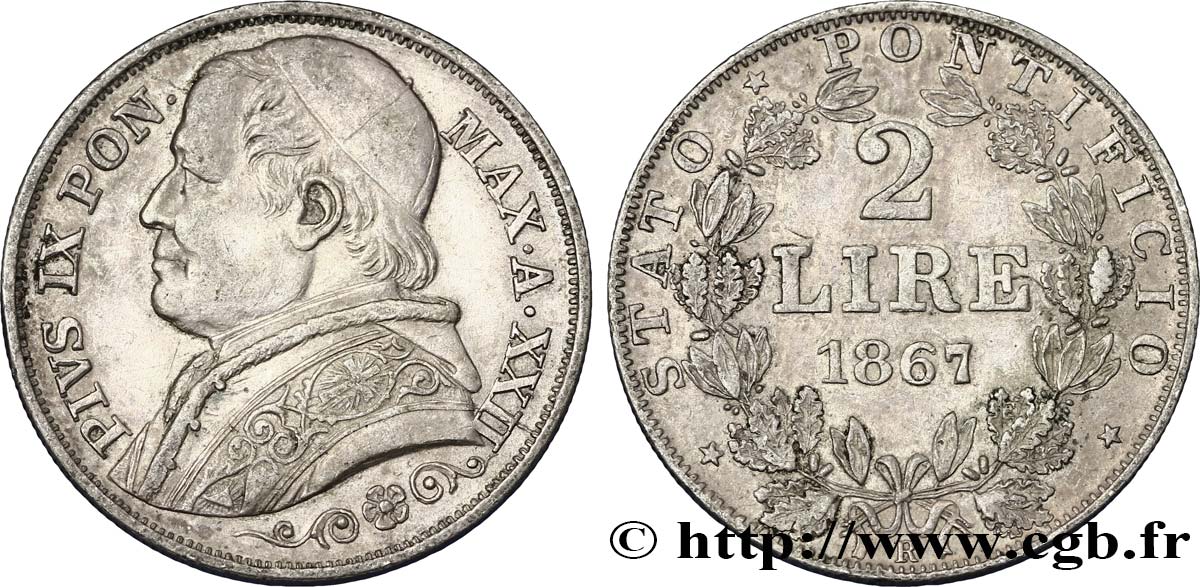
 Segnalare un errore
Segnalare un errore Stampate la pagina
Stampate la pagina Condividi mia selezione
Condividi mia selezione Fai una domanda
Fai una domanda Consegnare / vendere
Consegnare / vendere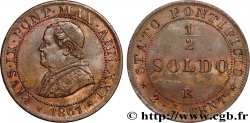
 Descrittivo
Descrittivo